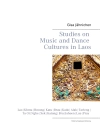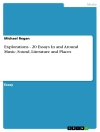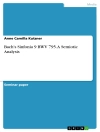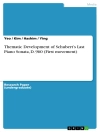Research Paper (postgraduate) from the year 2011 in the subject Musicology – Miscellaneous, grade: 1, , language: English, abstract: The fingering logic and performing of woodwind instruments. A psychological study and model.
Since there is no empirical research about woodwind-playing, this work shows a way, for example, to calculate ‘Fear Parts’, and how you can circumvent them, or how you can find the best aesthetic fingering sequences.
The analysis of explorative tests showed a correlation between subjective difficulty and the number of fingers in use or the change and the resulting number of finger movements. In order to explain this situation, I use a fingering table, where “0” represents open or keys not pressed, and in “1” closed or pressed keys (Conjunctors). With this table, it was possible for me to handle images as vectors and represent them together with their transformations to make a comparison. With the vector sum, I had the opportunity to compare the subjective results with the calculated values. The relationship between subjective perception and calculated level of difficulty was given. These results make it possible to create a forecast model of optimal fingering sequences for musicians, teachers and composers, without knowing about the playing of a clarinet. These calculations also enable the Aesthetic Analysis of pieces, if the fingering table is expanded with aural criteria. Passages of pieces could be transcribed to other instruments, and be reviewed on their playability, when a sound situation requires this.
This is a crude tool and should be extended to acoustically-physical and aesthetic parameters, to make further developments of the clarinets (Vienna clarinet and French clarinet). The aim of further development of wind instruments should be: Optimizing and expanding sound and fingering techniques appearances. Advantages of the fingering of each clarinet system should be usable on other instruments and, apart from the bore of the systems, universal.
Sobre el autor
Work experience
Musician
self-employed
01/01/1993 – Current
• Austria
Guide
self-employed
01/06/2014 – Current
• Graz, Austria
Culture, music
Visitors service
Universalmuseum Joanneum
01/05/2013 – 31/08/2017
• Graz, Austria
Visitors service
Art-historical Museum
01/06/2011 – 31/03/2013
• Vienna, Austria
Project researcher
University of Life Sciences
01/04/2012 – 01/06/2012
• Vienna, Austria
Visiting professor
Edward Said National Conservatory of Music – Birzeit University
01/09/2010 – 30/06/2011
• Ramallah, Autonomous Palestinian Territories
Music courses
Museum service
Art-historical Museum
01/10/2009 – 30/04/2010
• Vienna, Austria
Music teacher
Music school
01/09/1996 – 10/07/2009
• Vasoldsberg, Austria
Headmaster
Music school
01/08/1998 – 10/07/2008
• Vasoldsberg, St. Ulrich am Waasen
Education and training
University of music in Graz
Ph D Musicology, Ethnomusicology
01/10/2016 – 18/03/2020
• www.kug.at
Bfi – University of applied studies
Tourist guiding – national license
01/10/2011 – 31/01/2013
University of Graz
Magister (Master) Systematic Musicology
01/10/1998 – 15/09/2008
• www.uni-graz.at
• Field(s) of study: Arts and humanities, psychology
University of music in Graz
Bakkalaureus (BA) Music education
01/10/2003 – 01/05/2004
Gustav Mahler Privat-universiy
Certification program – Clarinet, Music theory
01/09/2000 – 20/02/2002
• https://www.gmpu.ac.at/
University of music in Graz
Wind band conductor
01/10/1993 – 30/06/1995
BORG Monsberggergasse
Highschool diploma
10/09/1994 – 08/06/1998
Language skills
Mother tongue German
Other languages
English Listening C2 Reading C2 Spoken interaction C2 Spoken production C2 Writing C2
Portuguese Listening C2 Reading C1 Spoken interaction C1 Spoken production C2 Writing C1
Slovenian Listening C1 Reading B2 Spoken interaction B1 Spoken production B2 Writing B1
Latin Listening B2 Reading C2 Spoken interaction A2 Spoken production A2 Writing C2
Indonesian Listening A2 Reading A2 Spoken interaction A2 Spoken production A2 Writing A1
Other skills
• Microsoft Office
• social Media
• Organizational and planning skills
• Zoom, Skype
• Google Docs
• Google Drive
• You Tube
• Internet user
• Team-work oriented
• Good listener and communicator
EC-Europass












